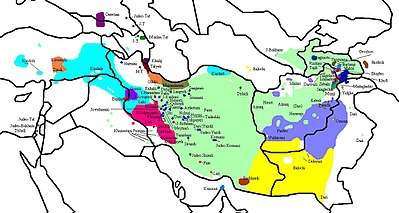List of loanwords in Assyrian Neo-Aramaic

Loanwords in Assyrian Neo-Aramaic came about mostly due to the contact between Assyrian people and Arabs, Iranians, Kurds and Turks in modern history, and can also be found in the other two major dialects spoken by the Assyrian people, these being Chaldean Neo-Aramaic and Turoyo.[2] Assyrian is one of the few languages where most of its foreign words come from a different language family (in this case, Indo-European).[3]
Unlike other Neo-Aramaic languages, Assyrian has an extensive number of latterly introduced Iranian loanwords[4] Depending on the dialect, Arabic loanwords are also reasonably present.[5] Some Turkish loanwords are Turkified words that are of Arabic origin.[6] To note, some of the loanwords are revised (or "Assyrianized"), and therefore would sound somewhat different to the original word.[7] Furthermore, some loanwords may also have a slightly different meaning from the original language.[8]
Arabic
- Askari (soldier)
- 'Alasas (as if) - Some speakers
- Donyeh (world)
- Bas (but) - Some speakers
- Boori (water pipe)
- Chakooch (hammer)
- Hookma (government)
- Ës-Haal (diarrhea) - Some speakers
- Fendëq (hotel)
- Ghareeb (strange) - Some speakers
- Ghëssāla (washing machine)
- Mistashfa (hospital)
- Mūḥāmi (lawyer) - Some speakers
- Ooty (clothes iron)
- Qëssa (forehead)
- Sadra (chest)
- Sākh (healthy)
- Sejën (jail) - Some speakers
- Thelaja (fridge) - Some speakers
- Ṭiyāra (aeroplane)
- Yëlla (hurry up) - Some speakers
Persian
- Bush (more)
- Changal (fork)
- Charëk (quarter)
- Dardeh (sorrow)
- Dormānah (medicine)
- Erzan (cheap)
- Ham (also)
- Halbat (of course)
- Hasanay (easy)
- Hitch (nothing)
- Janta (purse/backpack)
- Jëzdan (wallet)
- Khiyāra (cucumber)
- Majboor (duty or obligation)
- Mees (table)
- Pënjara (window)
- Ranga (colour)
- Rāzi (satisfied)
- Sabab (reason)
- Tambal (lazy)
- Zahmat (difficult)
- Zarda (yellow)
Kurdish
- Aqlah (leg)
- Chapleh (left)
- Choom (close/lock)
- Hāwar (aid)
- Hiwi (hope)
- Qësset (story)
- Qonya (drain/well)
- Razël (to shame or scold)
Turkish
- Balkët (maybe)
- Dabanja (gun)
- Doos (straight or flat)
- Gamee (ship)
- Hāzir (ready) - Arabic, Hadir (حاضر), "present'"
- Kësmet (fate) - Arabic, Qisma (قسمة), "division"
- Pashgër (towel)
- Rahat (comfortable) - Arabic, Raha (راحة), "relaxation"
- Tamëz (clean) - Arabic, Tamy (تمييز), "refinement"
- Taws (dust)
- Zengën (rich) - Persian, Sang (سنگين), "precious"
Other
These foreign words are borrowed from European languages:
- Atmābël (automobile/car) - French, English
- Benzën (petroleum) - German: Benzin
- Batree (battery) - French: batterie, English: battery
- Beera (beer) - Old English: beor, from Latin: bibere
- Bomba (bomb) - English: bomb, French: bombe, from Greek: bombos
- Bye (bye)
- Chayik (to check or inspect) - Middle English; the noun and exclamation from Old French eschec, from medieval Latin scaccus, via Arabic from Persian šāh ("king")
- Glāss (glass cup) - English
- Hallao (hello)
- Jamëka (twin) - Latin: geminus, French: jumeau, Portuguese: gêmeo
- Lōrry (truck) - British English
- Māshina (train or car) - English: machine, from Greek: mekhos
- Maymūn (monkey) - Middle Greek: Mimoun (μῖμων), "imitators, ape, mimicry"
- Pākët (packet) - English, Anglo-Norman French
- Sōleh (shoe) - English: sole, Latin: solea, Kurdish: sol
- Stumkā (stomach) - English, Greek: stómachos; Latin: stomachus
- Stōp (stove/heater) - English
- Tëlvizion (television) and Tileefon (telephone) - English, Latin, Greek
See also
- Chaldean Neo-Aramaic, a language (also considered a dialect of Assyrian) which also uses some of these loanwords.
- List of English words of Semitic origin
- Hybrid word
- Morphology
- Syriac Latin alphabet
References
- ↑ Yohannan, A. (1900). A Modern Syriac-English dictionary, Part 1, New York.
- ↑ Yildiz, Efrem, The Aramaic Language and Its Classification, Journal of Assyrian Academic Studies 14:1 (2000)
- ↑ Odisho, Edward Y. (2002). „The role of aspiration in the translation of loanwords in Aramaic and Arabic“, W. Arnold and H. Bobzin (ed.): Sprich doch mit deinen Knechten aramäisch, wir verstehen es! 60 Beiträge zur Semitistik. Festschrift für Otto Jastrow zum 60 Geburtstag, Wiesbaden, 489-502.
- ↑ Younansardaroud, Helen, Synharmonism in the Särdä:rïd Dialect, Journal of Assyrian Academic Studies 12:1 (1998): 77-82.
- ↑ The Neo-Aramaic Dialect of Barwar, Geoffrey Khan, Boston, 2008
- ↑ Yamauchi, Edwin M., Greek, Hebrew, Aramaic or Syriac? A Critique of the Claims of G.M. Lamsa for the Syriac Peshitta, Bibliotheca Sacra 131 (1974): 320-331.
- ↑ Yohannan, Abraham, Some Remarks Regarding the Pronunciation of Modern Syriac, Journal of the American Oriental Society 25 (1904)
- ↑ Younansardaroud, Helen (1999). „The influence of Modern Persian on the Särdä:rïd dialect“, Journal of Assyrian Academic Studies, XIII:65-68.